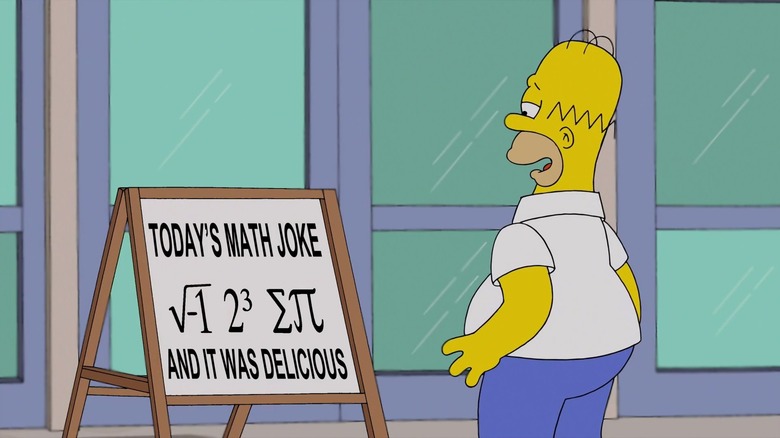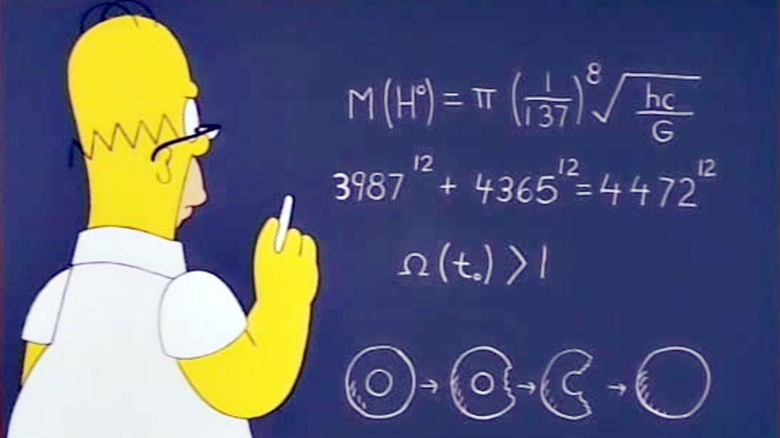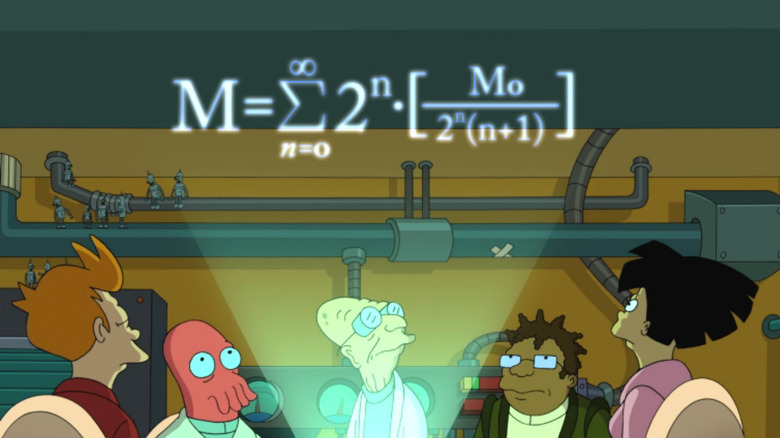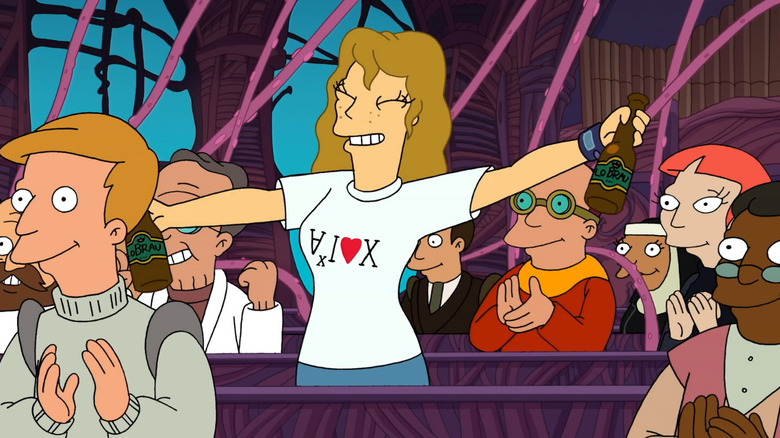A Simpsons Joke No One Was Meant To See Helped Build Futurama's Fanbase
In case it needed reiteration, David X. Cohen — writer on "The Simpsons" and co-creator of "Futurama" — is a big, big nerd. He has a B.A. in Physics from Harvard and an M.S. in Computer Science from UC Berkeley. Additionally, he clearly loves jokes about math, science, and technology, and savvy, well-educated viewers of "Futurama" will likely understand at least a handful of the show's many mathematics jokes laid out in plain view. I can think of no other sitcoms, for instance, that feature an extraterrestrial Harlem Globtrotter referring to the 19th-century Polish mathematician Józef Hoene-Wrońskye.
Cohen began his career writing for animated programs back in 1992 when he started penning scripts for Mike Judge's "Beavis and Butt-Head." Yes, it takes a lot of intelligence to write dumb jokes. The following year, Cohen started writing for "The Simpsons" and would eventually work on 14 separate episodes, including five of the celebrated "Treehouse of Horror" specials. By 1998, Cohen and Groening had become professionally close enough to co-create the 31st-century sitcom "Futurama" together. Working in sci-fi clearly allowed Cohen to flex his math muscles and include all the oblique scientific references he always wanted.
Prior to "Futurama," however, Cohen admits that he started to sneak in math references into "The Simpsons." Cohen admitted as much on the Wired Magazine podcast "Geek's Guide to the Galaxy." His math jokes, he said, weren't meant to be the highlight of a scene, but whenever someone passed a blackboard on "The Simpsons," Cohen took the opportunity to fill it with actual mathematical formulae that only fellow nerds would understand.
As it happened, more people got the math jokes than one might have expected. "Futurama," it seems, had a pre-set fanbase waiting in the wings.
The Simpsons and Their Mathematical Secrets
Cohen wanted to address the "Eureka!" moment upon discovering the existence of the 2013 book "The Simpsons and Their Mathematical Secrets" by Simon Singh. The book, Cohen found, took a deep dive into the math jokes that he and other "Simpsons" writers had long peppered the show with, and he was flattered and astonished that Singh not only understood the references, but thought to essentially annotate them. Cohen recalled the book, thinking it to be overwhelming. He said:
"This is a very surreal chapter in the history of 'The Simpsons' and 'Futurama,' this book that Simon Singh wrote. The reason being that when we first started sticking little math jokes in the background of 'The Simpsons' -– which is the subject of the book I guess I should say –- the jokes we were sticking in were really not intended for a mass audience. The reason we started putting these jokes in was that we had empty space in the background of an animated show and we thought, 'Oh! you know, 'We've already written this scene, but we can still stick another joke in the background!'"
There was already a blackboard in the scene, Cohen figured, so one might as well fill it with real math. That would lend the show a little bit of intellectual verisimilitude underneath the show's broad sitcom idiocy. He felt free to include some brainier gags that only he and his old math buddies would get. He continued:
"[H]aving come recently from computer science, put a few math jokes in the background thinking, 'Oh, my old friends will appreciate this,' and a few of the other science and math writers did similar things. We really didn't plan for more than about eight people to see these jokes."
The internet is for Björn (Engquist)
Like so many of us, Cohen didn't predict the rise of the internet, and its habit of archiving pop culture's nerdiest gags. Those who remember the early days of the internet likely know about its tendency to plant the ultra-nitpicky seeds of what would eventually become mainstream geek culture. "[T]hat's when I really became aware of this phenomenon with 'The Simpsons' and later 'Futurama,'" Cohen said, "where there's an opportunity to put in jokes that very few people will get." It didn't matter how obscure the joke was, someone somewhere was going to be looking up. Cohen continued:
"You know, you could stick in a joke about Fermat's Last Theorem, which I did, and very, very few people are going to try this on a calculator and get the joke. But the people who do are so amazed that you stuck this thing in that was so obscure and so tailored for them that they're really a fan for life after that. So you might only add twelve fans at a time, but they become these hardcore fans. And 'Futurama' especially I think had an audience composed of that kind of fan, fans that were like, 'I can't believe that they made a show for me!'"
Fermat's last theorem, for laypeople, states that there are no natural numbers in the equation xn + yn = zn when n is greater than 2. A cube, it says, cannot be the sum of two cubes.
Math-heads who spotted that, Cohen knew, weren't exactly legion, but they were passionately devoted. They were, Cohen said "an audience that later saved our neck when we were canceled repeatedly, they demanded our return."
The jokes for eight people
Note that "Futurama" has been canceled three times in its life, and resurrected three times. It's currently enjoying a new season on Hulu after having run on Fox and on Comedy Central. The "Futurama" fan base isn't quite large enough to please numbers-obsessed studio executives but is loud and nerdy and passionate enough to stand up for the show when it gets canned. "Futurama" is up there with the most canceled and resurrected series in TV history.
"The Simpsons" was the testing ground, "Futurama" was the practical field application, and the publication of "The Simpsons and Their Mathematical Secrets" was the proof positive. Cohen's only regret seems to be that he has forgotten the meaning of some of his "Simpsons" jokes because he wrote them so long ago:
"[I]t's been very surreal to me that over the years more and more people have latched onto these math jokes, and it got to the point that this well-known science writer, Simon Singh from England wrote this book, 'The Simpsons and Their Mathematical Secrets' that really is entirely about these math jokes that were for eight people, so it's come to a mass audience now and we've entered a surreal chapter in the history of these shows where I'm doing interviews about math suddenly that I haven't thought about in twenty years, so don't quiz me."
I close with a math joke. Why isn't π on Twitter? Because it needs more than 280 characters to express itself.



